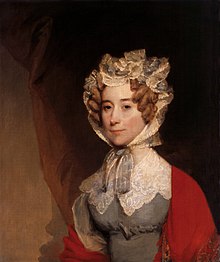
Back لويزا آدامز Arabic لويزا آدامز ARZ Louisa Adams AST Luiza Katrin Adams Azerbaijani Луіза Адамс Byelorussian লুইসা অ্যাডামস Bengali/Bangla Louisa Adamsová Czech Louisa Adams German Λουίζα Άνταμς Greek Louisa Adams Spanish
Louisa Adams | |
|---|---|
 Portrait by Gilbert Stuart c. 1821–1826 | |
| First Lady of the United States | |
| In role March 4, 1825 – March 4, 1829 | |
| President | John Quincy Adams |
| Preceded by | Elizabeth Monroe |
| Succeeded by | Emily Donelson (acting) |
| Personal details | |
| Born | Louisa Catherine Johnson February 12, 1775 City of London, England |
| Died | May 15, 1852 (aged 77) Washington, D.C., U.S. |
| Resting place | United First Parish Church |
| Spouse | |
| Children | 4, including George, John II and Charles |
| Signature | |
Louisa Catherine Adams (née Johnson; February 12, 1775 – May 15, 1852) was the first lady of the United States from 1825 to 1829 during the presidency of John Quincy Adams.
She was born in England and raised in France. Her father was an influential American merchant, and she was regularly introduced to prominent Americans. After her family returned to England, she met John Quincy Adams in 1795, and the two began a tenuous courtship. They married in 1797 after being engaged for a year, beginning a marriage of disagreements and personality conflicts. She joined her husband on his diplomatic mission to Prussia, where she was popular with the Prussian court. When they returned to the United States, her husband became a senator and she gave birth to three sons. John was appointed minister to the Russian Empire in 1809, and they traveled to Russia without their two older sons, against Louisa's wishes. Though she was again popular with the court, she detested living in Russia, especially after the death of her infant daughter in 1812. She lived in Russia alone for a year while John negotiated the Treaty of Ghent, and when he asked her to join him in 1815, she made the dangerous 40-day journey across war-torn Europe.
The Adamses lived in England for two years before returning to the United States when John was appointed Secretary of State. Louisa became a prominent cabinet wife and regularly hosted important guests in her home. She worked to build connections for her husband's 1824 presidential run, allowing for his victory. She was unsatisfied in the White House, where she became reclusive and grew distant from her husband. She instead took to writing, producing plays, essays, poems, and an autobiography. She wished for retirement after her husband lost re-election, but he was elected to the United States House of Representatives. She took a more active interest in politics, supporting abolitionism and greater rights for women in society. She was widowed in 1848, and she had a stroke in 1849 that left her with limited mobility. She died on May 15, 1852, at the age of 77, and Congress adjourned for her funeral, the first time a woman was honored in this way.
She was the only foreign-born first lady of the United States until 2017, when Melania Trump became first lady. Her tenure as first lady is not as well studied as other parts of her life, due to her reclusiveness and the limited records she kept at the time. Still, she is generally rated in the upper half of first ladies by historians.